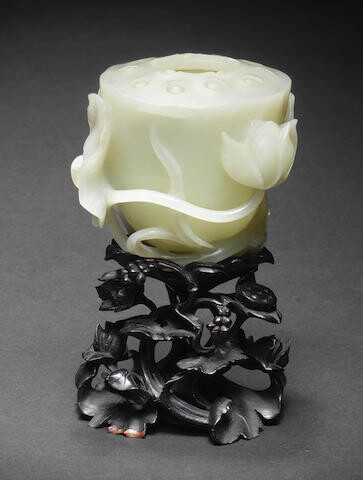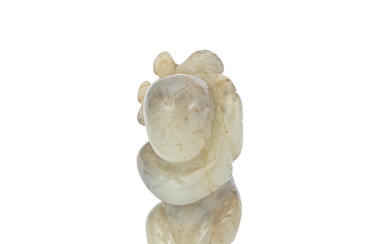A PALE GREEN JADE 'LOTUS POD' WATER POT
18th century
18th century
Finely hollowed in the form of an open lotus pod with lotus seeds around the mouth rim, with flowering lotus stems and leaves encircling the body, the stone of even pale-green tone, with a finely carved hongmu stand and cover. 9.5cm (3 3/4in) high (3).
十八世紀 青白玉蓮蓬式水盂
Provenance:
Collier, sold to Bluett's on 21 March 1928
Bluett & Sons Ltd., London
E. A. Parry (1879-1946), London, acquired from the above on 23 May 1928, and thence by descent
來源:
Collier舊藏,1928年3月21日售與倫敦古董商Bluett's
倫敦古董商Bluett & Sons Ltd.
倫敦E. A. Parry(1879-1946)舊藏,於1928年5月23日購自上者,並由後人保存迄今
Compare with a related pale green jade lotus-leaf washer, Qing dynasty, in the Qing Court Collection, illustrated in the Compendium of Collections in the Palace Museum: Jade 10: Qing Dynasty, Beijing, 2011, no.195.
The shape of a lotus pod signifies good fortune for the owner. The lotus flower, hehua, symbolises both marriage and purity. As the lotus is one of the few plants whose seed pods are visible when the flower begins to bloom, it is also associated with the early arrival of sons. The seed pod, bursting with seeds, is a symbol of fertility, and the leaf, heye, is a pun for harmony, hexie.
Two related pale green jade 'lotus' water pots and covers, 18th century, were sold, respectively, at Bonhams Hong Kong, 14 May 2015, lot 111, and Bonhams London, 5 November 2020, lot 168.
青白玉質,以蓮蓬為盂形,外壁繞以鏤雕蓮枝蓮葉,生動自然。蓮(荷)在中國傳統文化中極具象徵意義,文人讚頌其出淤泥而不染之高潔品德;「荷」與「和」同音,喻意和諧;蓮有蓮蓬而多子,且作為少數種子與花同時生長的植物,亦有「早生貴子」、「多子多福」之意。
故宮博物院館藏一例清青玉荷葉水族洗,收錄於《故宮博物院藏品大系:玉器編10,清》,北京,2011年,編號195,可資比對。
參考邦瀚斯香港售出一件十八世紀青白玉蓮蓬式水盂,2015年5月14日,拍品編號111,及邦瀚斯倫敦售出一例,2020年11月5日,拍品編號168。
View it on
Sale price
Estimate
Time, Location
Auction House
18th century
18th century
Finely hollowed in the form of an open lotus pod with lotus seeds around the mouth rim, with flowering lotus stems and leaves encircling the body, the stone of even pale-green tone, with a finely carved hongmu stand and cover. 9.5cm (3 3/4in) high (3).
十八世紀 青白玉蓮蓬式水盂
Provenance:
Collier, sold to Bluett's on 21 March 1928
Bluett & Sons Ltd., London
E. A. Parry (1879-1946), London, acquired from the above on 23 May 1928, and thence by descent
來源:
Collier舊藏,1928年3月21日售與倫敦古董商Bluett's
倫敦古董商Bluett & Sons Ltd.
倫敦E. A. Parry(1879-1946)舊藏,於1928年5月23日購自上者,並由後人保存迄今
Compare with a related pale green jade lotus-leaf washer, Qing dynasty, in the Qing Court Collection, illustrated in the Compendium of Collections in the Palace Museum: Jade 10: Qing Dynasty, Beijing, 2011, no.195.
The shape of a lotus pod signifies good fortune for the owner. The lotus flower, hehua, symbolises both marriage and purity. As the lotus is one of the few plants whose seed pods are visible when the flower begins to bloom, it is also associated with the early arrival of sons. The seed pod, bursting with seeds, is a symbol of fertility, and the leaf, heye, is a pun for harmony, hexie.
Two related pale green jade 'lotus' water pots and covers, 18th century, were sold, respectively, at Bonhams Hong Kong, 14 May 2015, lot 111, and Bonhams London, 5 November 2020, lot 168.
青白玉質,以蓮蓬為盂形,外壁繞以鏤雕蓮枝蓮葉,生動自然。蓮(荷)在中國傳統文化中極具象徵意義,文人讚頌其出淤泥而不染之高潔品德;「荷」與「和」同音,喻意和諧;蓮有蓮蓬而多子,且作為少數種子與花同時生長的植物,亦有「早生貴子」、「多子多福」之意。
故宮博物院館藏一例清青玉荷葉水族洗,收錄於《故宮博物院藏品大系:玉器編10,清》,北京,2011年,編號195,可資比對。
參考邦瀚斯香港售出一件十八世紀青白玉蓮蓬式水盂,2015年5月14日,拍品編號111,及邦瀚斯倫敦售出一例,2020年11月5日,拍品編號168。




